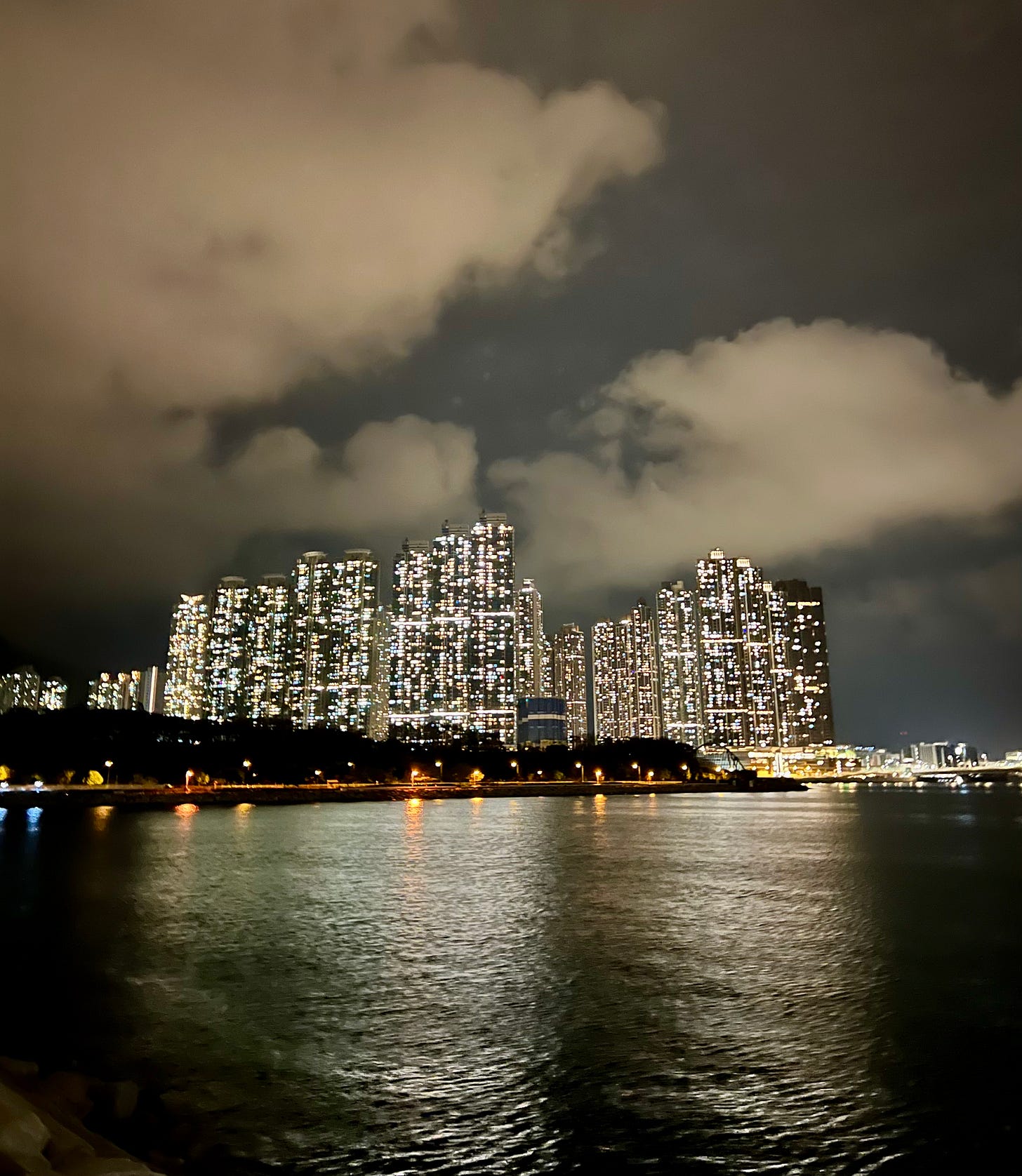Letters to Strangers: To the elderly restaurant owner on my flight to Hong Kong—
April 6, 2023: Hong Kong
“Pollo o arroz?”
The flight attendant asks you — a stoic, elderly Chinese woman. It’s late, even for plane time, but this jerks my attention. You reply in Spanish, and I’m brimming with questions: why does this flight attendant, en route from Italy to Hong Kong, default to Spanish when talking to you?
But you’re the first to strike up a conversation — blankly asking if I’m “japonesa”. Your mother tongue is Cantonese, and my mother tongue is English, but we manage with our thin linguistic overlap of Mandarin, clumsily repeating phrases and simplifying ideas to piece together each other’s stories. Since immigrating from Guangzhou to Peru 16 years ago, you’ve established five Chinese restaurants across the country. You say this matter-of-factly, your weathered face unsmiling, as if there is no other world in which you don’t become a self-made restaurant tycoon. Though your children and grandchildren all live in Peru now, you’re on your way to visit the few family members still living in southern China.
The contents of high school Spanish class float to the surface of my mind, and I remember learning about Chifa, Chinese-Peruvian cuisine, a name derived from the Chinese word “chi fan” or “to eat.” In the mid-19th century, Chinese laborers who had immigrated to Peru wanted to replicate dishes from home but lacked authentic ingredients, substituting them with local foods. The cultural exchange flows both ways — much of modern-day Peruvian cooking has adopted imports from Chinese immigrants (e.g., lomo saltado, a wok stir-fry with soy sauce). The Chinese population found its niche in the restaurant industry, and Chifa became one of the most popular types of food in Peru.
I immediately tried to jot down the names of your restaurants, but you struggled with the pinyin function on my phone. I settled for only a few phonetics I hoped to search for later.
I was in awe of your accomplishments, and by how easy you made them seem, but you had your share of quirks. When you grew weary of watching a nondescript J-Lo movie with no audio and no subtitles, you patrolled the aisles around us, making sure no one had their seat reclined on our cramped, red-eye flight. The tall Italian man seated diagonally from you sought sleep by reclining his seat, but you, unperturbed, reached over and clicked his seat's button, roughly nudging it back to its upright position.
How odd it was to see you, a menacing presence just barely over five feet, carving your own rules into stone tablets and enforcing them with an iron fist. Is this how you, hardened by the trials and tribulations of building your empire, shouldered your way into the restaurant business? Or, perhaps, am I giving you too much credit, and the power has gone to your head? The only thing I was certain about was your kindness to me, insisting that I wear a jacket over my blanket in the pushy way of a Chinese mother, affection conveyed through demand.
Chinese emigrants rarely preserve their traditional first names and give their children the cultural names of the country they’ve immigrated to — prominent Chinese-Peruvian figures include Julio, Felipe, and Magdalena. In Italy, children are named Valentina, Angelo, Alessandro. The imperative to adapt is woven into the DNA of an immigrant, and you’re no different. In your two decades in Peru, you’ve learned Spanish, Limeño culture, and spread your financial and familial roots. When the flight attendant realized you didn’t speak English, she tried again in Spanish.
But you felt that Peru was perhaps not as welcoming; with no access to senior care for non-citizens, survival was self-determined. When forsaken by a country you call home, even the monolith of your character wavered. And I wonder, is your self-assurance the cause of your success or a byproduct?
I have no doubt you’re doing well for yourself, though. I asked you, was it tough to manage five restaurants across the country?
You replied — “No, I’m the top dog. Everyone does the work for me.”
My inspiration for this series, Letters to Strangers, comes from the compilation of the same name by Colleen Kinder. She writes:
“We spend so much of our lives in the company of people whose names we’ll never know, people we’ll never meet again. How rarely we honor them. How rarely we admit to ourselves the strange, unannounced ways they can lodge inside of us.
These essays don’t say, I knew you. They say, I never really knew you. They confess their own partial gazes. They open up territories we didn’t know we had inside of us. They offer themselves as vessels for our least official ghosts.”
Memory is imperfect, romantic, and often a reflection of ourselves. Writing letters to strangers allows me to embrace this semi-reality.



Nice writing! Touch deep inside! Love it so much!